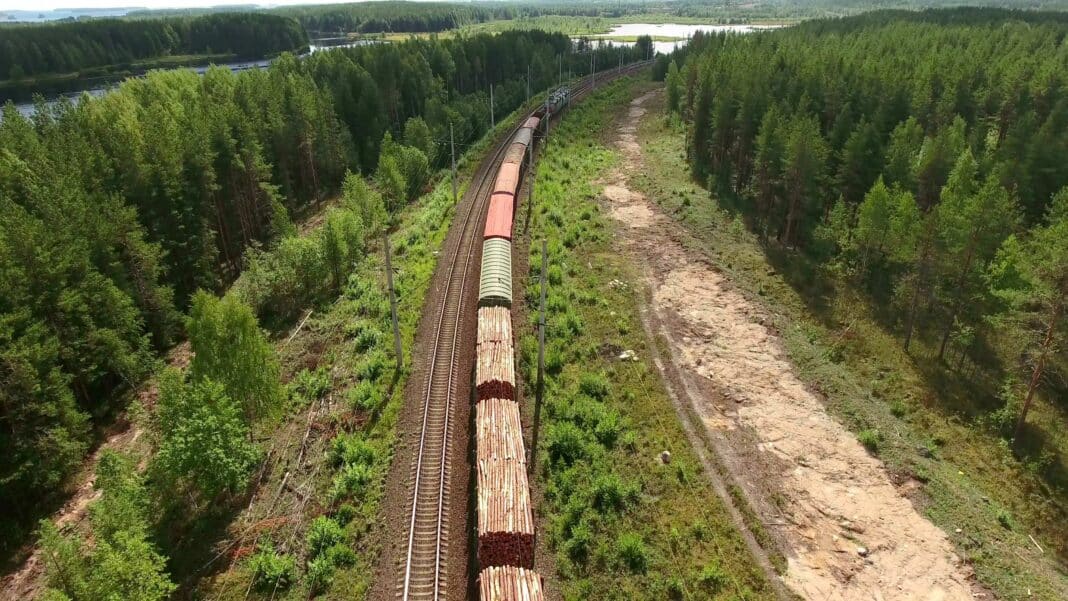On Friday, US President Joe Biden responded to the death of dissident Aleksei Navalny with a new raft of sanctions targeting hundreds of Russian entities and individuals.
And yet, despite a concerted push by Ukrainian ENGOs, the US has refrained from sanctioning Russian timber – which now makes up 50% of all imports from Russia.
Last week, Wood Central reported that the Ukrainian Nature Conservation Group (UNCG), the ICO “Environment-People-Law” (EPL), the Center for Environmental Initiatives Ecoaction, the Bureau of Environmental Investigation and Ecosociety alleged that the Russian military “directly controls an area of forest twice the size of New Jersey,” with the army profiting from the sale of timber, transported from Russia through Eurasia.
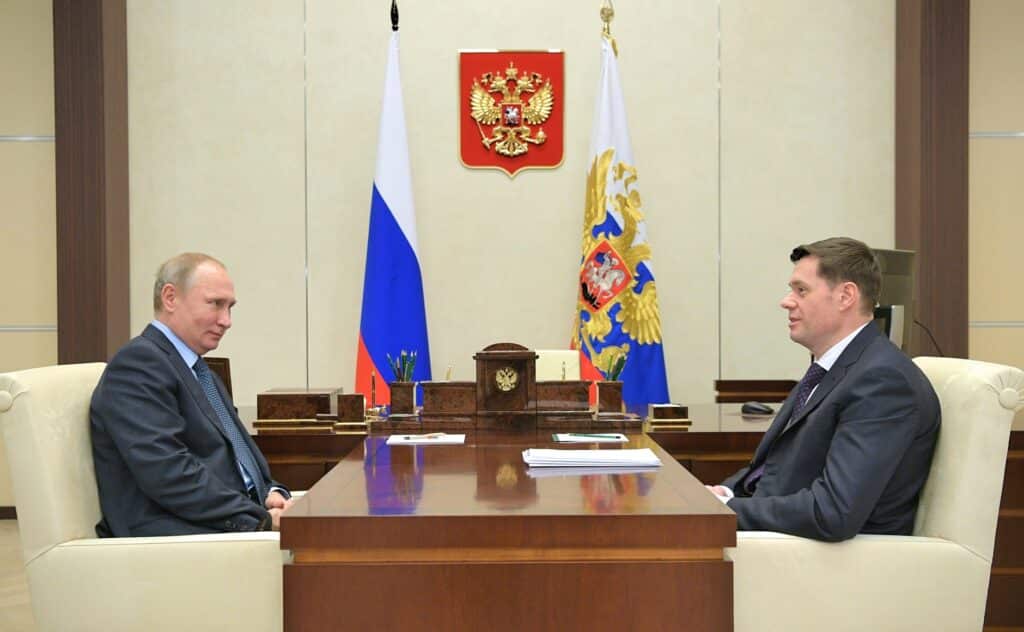
Now, an op-ed published by Earthsight has urged the Biden administration to follow the UK and EU and “immediately bar Russian timber, pulp & paper imports.”
“All of Russia’s forests are state-owned, with dues from logging flowing to it. Some forests are even under the control of Russia’s military, which allows the logging and sale of timber in its forests. Since the war began, U.S. Customs data show the nation has imported nearly $2 billion of timber from Russian companies – for birch plywood alone,” it said.
“Much of this may help finance Russia’s war machine in Ukraine and help prop up Putin’s rule. These sales also enrich his cronies. Giant Russian plywood firms like Sveza, owned by oligarch Alexei Mordashov, who met with Putin on the day of the Ukraine invasion, are some of the largest suppliers of this wood.”
Together, Mordashov and other ‘timber oligarchs’ close to Putin control a chunk of Russian forest the size of France. Last year, Wood Central reported that Putin’s closest allies, including Alexei Mordashov, Russia’s richest citizen, run timber and forest-based that have so far avoided Western Sanctions and fuelled the ongoing conflict.
“Research suggests that these circumventions are resulting in timber worth almost $13 million from countries like Kazakhstan, China and Turkey entering the E.U. each month (alone),” Earthsight said, “with much of it, as tip-offs from industry insiders suggest, also linked to oligarch-owned firms.”

Russia and Belarus use Eurasian allies to sell timber into global markets
Before the war, Russia was the EU’s fifth largest trading partner in 2021, exporting more than $3 billion worth of timber to the bloc and whilst Wood Central has reported that volumes fell dramatically, an investigation by the International Consortium of Investigative Journalists (ICIJ) has found that Russian timber is still entering the EU despite sanctions to curb timber revenue.
As reported exclusively by the publishers of Wood Central in 2022, record shipments of ply used in laminated veneer lumber were entering the Australian marketplace via China.
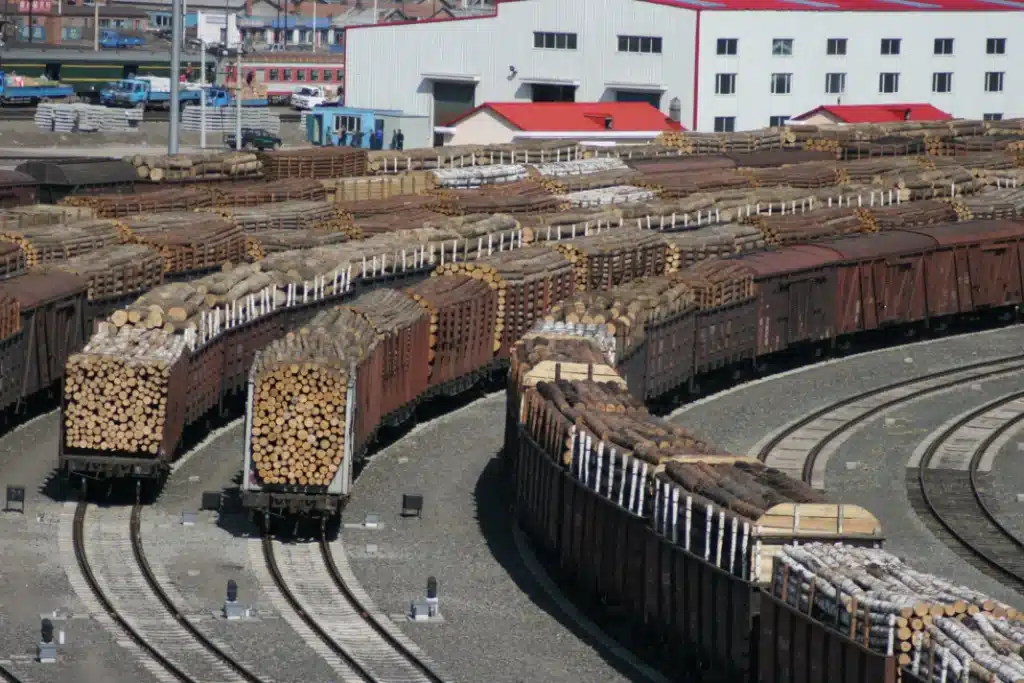
The ICIJ’s Deforestation Inc. has identified new routes through China, Turkey and other countries, adding to the traders using Kyrgyzstan and Kazakhstan previously reported by the Organised Crime and Corruption Reporting Project (OCCRP).
Reporters used customs data to trace cases of Russian wood bypassing bans and entering the EU, identifying upticks in EU timber imports from several countries after sanctions were imposed on Russia.
The investigation is part of ICIJ’s Deforestation Inc. project, which uncovered how major certification firms validate products linked to deforestation, logging in conflict zones and other abuses.
In April, Wood Central reported on the project, which scrutinised over 2000 instances involving 410 companies purportedly involved in environmental transgressions across a minimum of 50 countries.
The project showed how Myanmar teak continued to enter markets in the US and the EU sporting green labels, despite sanctions intended to remove a crucial funding source for the military regime that toppled a democratically elected government in 2021.

This is the material that the Environmental Investigation Agency (EIA) accused Oceanco of using in Jeff Bezos USD 500 million superyacht.
More than 100,000 tonnes of lumber have entered Germany, France and other EU countries as part of one of Russia’s biggest illegal timber scandals, it is alleged.
The business is, in turn, linked to two companies registered in the UK.
The report by environmental group Earthsight, suggests trees in Siberia are being plundered at an alarming rate.
The remote region has bears, wolves, lynxes and endangered tigers. Its peat and frozen soils store vast amounts of carbon.
In Russia, the state similarly owns – and therefore benefits financially from them – the country’s forests.
It temporarily grants rights to companies and individuals for commercial logging.
Several oligarchs with close ties to the Kremlin own Russia’s largest timber companies, together controlling a forested area as large as France, according to Earthsight, a British environmental nonprofit.
Messages obtained by the ICIJ partners revealed traders with connections to Russia offering to sell timber from Turkey, Kazakhstan and China.
Some masked timber origins with false certifications, while others explicitly outlined how they manoeuvred around sanctions.
“We have our own processing company and can easily process the imported [Russian] larch and export it to you,” reads one leaked message from a Chinese trader.
“This way you can easily obtain Russian larch produced in China.”
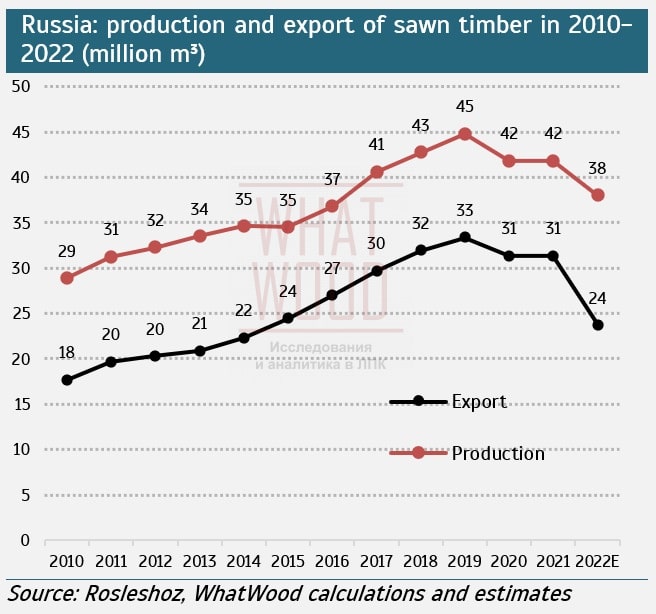
Another timber company based in Turkey describes how it can export wood from Russia to the EU by granting products Turkish certificates of origin, providing a “legal mechanism of operation for import and export with Russia, Turkey and Europe”.
In Europe, key stakeholders such as the European Confederation of Woodworking Industries say they know the issue.
“We have been alerted by several of our national member organisations about their companies receiving offers from countries that normally should not have the production capacity to make such offers,” a statement from CEI-Bois read.
The reality is that Europe’s sanction regime in response to Russia’s aggression on Ukraine is among the strictest, and therefore other countries are free to continue to trade with Russia.
A report has claimed that DIY shops across Europe are selling wood stolen from Russia’s far-east taiga region, where corruption contributes to the rapid destruction of virgin forests.
In Ukraine, the circumvention of trade sanctions has real consequences.
As Oleg Ustensko, adviser to Ukrainian president Volodymyr Zelensky, put it: “For families of killed and injured Ukrainians whose houses were destroyed by the Russian army, there is no difference whether this was paid for Russian wood, oil, gas or diamonds.”
Ustensko added: “All export revenues the Kremlin receives are eventually used for its war in Ukraine.”
How can global leaders address Conflict Timber?
According to Earthsight, the answer lies in “tightening the noose” in Russia and its allies.
“Looking to Russia’s co-aggressor Belarus, the E.U. would do well to finally ban its direct imports of furniture from Lukashenko’s torture-stained regime, which its recently announced 13th package of sanctions has disappointingly failed to do. The country’s timber industry has been dubbed ‘Lukashenko’s last gold mine’, and the E.U. has not explained why it has failed to ban furniture made in these ‘mines’ in recent rounds of sanctions.”
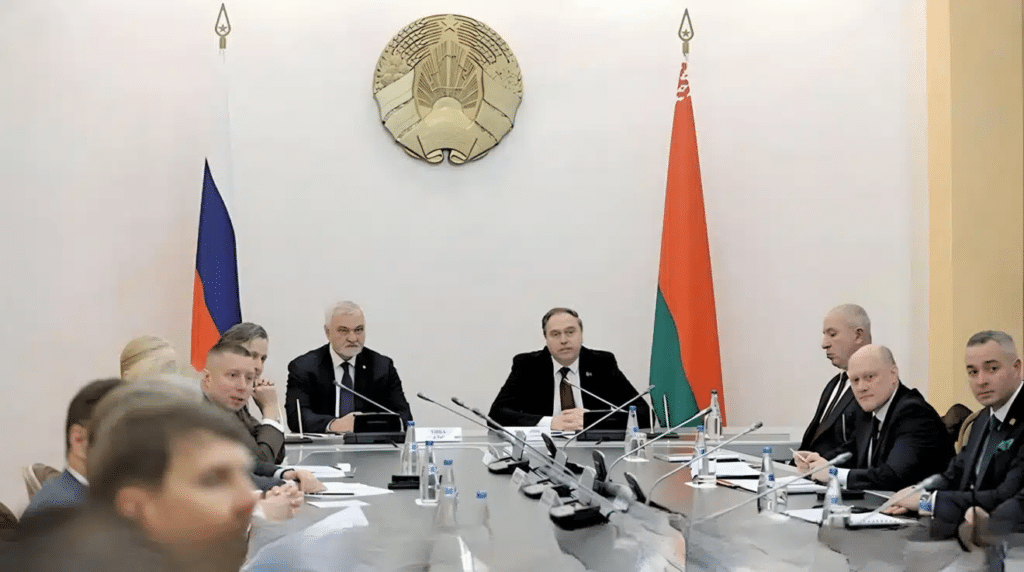
In 2023 alone, the bloc imported more than $108 million of Belarusian furniture, “with Poland and Germany responsible for much of that.” Belarus, it said, “is home to some of Europe’s last primeval forests, which are important carbon sinks, absorbing an estimated 35 million tons of CO2 annually,” adding that “As in Russia, its forests are state-owned.”
“Belarus’s prison service is the country’s largest timber company and uses the forced labour of 8,000 inmates (including political prisoners) who slave away in conditions that have been likened to Stalin’s gulags, making products with wood sourced from within Belarus’s unique national parks.”
It’s time to focus like lasers on Putin’s weaknesses and support Ukraine while also helping to protect our planet for future generations.



